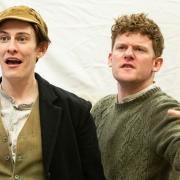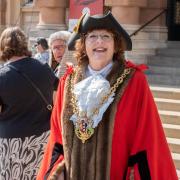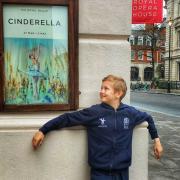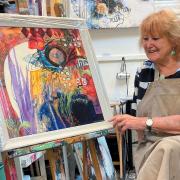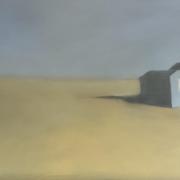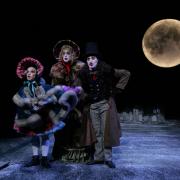An overlooked composer, a flamboyant playwright and a poet’s cat; a challenging and unusual mix of subjects for any author, but Oliver Soden’s biographies of Michael Tippett, Noel Coward and Jeoffry the cat have been described as ‘exceptional’, ‘inspirational’ and ‘captivating’.
This acclaim has made Oliver (at just 33) much sought after as a speaker, arts reviewer and broadcaster. Not bad, considering he never had any intention of being a writer.
He took a double first in English at Clare College, Cambridge. ‘I was one of those students who spent all their time at the theatre doing three plays a term,’ he says. ‘I hadn’t thought of writing at all.’ His family spent summers in Southwold with the great children’s writer Philippa Pearce, author of Tom’s Midnight Garden.
‘She was a family friend. She’d sit in the back of the car trying out all her stories on five-year-old me. And I used to marvel at the fact that she had a cupboard in her bedroom full of the hundreds of books that she had written,’ he says. ‘It seems clear to me now that there was an example in my childhood of someone who had managed to spend a life writing books.’
After university, Oliver took jobs as a literary assistant for the founder-director of the Royal Shakespeare Company, John Barton, and then as a researcher for BBC Radio 3’s Private Passions. He was just 25 when he was asked to take on the biography of Michael Tippett, a contemporary of Benjamin Britten who grew up in Wetherden, Suffolk.

Rather overshadowed by Britten, Michael Tippett is still considered one of the greatest composers of the 20th century. It was hoped a biography would raise his profile once more, but the person originally commissioned to write it died before it was complete. Tippett's widow handed the project to Oliver.
‘She showed immense trust,’ he says. ‘Tippett was always someone I had loved. I had been listening to his music since I was a child. I was astonished that this great composer was being so overlooked and felt that if I could remind people of what he did, then I should.’
It took him five years of ‘interrupted nights’ sleep,’ he says. He felt the weight of responsibility to do Tippett justice, and also to document all the historical events, politics and social changes during the period. ‘I kept thinking that if some doyen of biography – Michael Holroyd, Hermione Lee or Peter Ackroyd – had suddenly rung up and said, "don’t worry, I’ll do it" I would have said "thank God”, and handed it over.
'But then I became very proprietorial about it. Most writers know they’re writers and they cast about for a subject, whereas I had a subject which forced me into being a writer, and I went from there.’
He wrote and researched the book while continuing his work with the Private Passions team, a role he was offered after impressing as an intern. It was a dream job, meeting formidable talents in art, literature and music as they shared the music that most affected them. ‘There is something very special about watching Vivienne Westwood, or Joan Plowright, or Alan Bennett listen to their favourite pieces of music. They revealed themselves to us while listening to the music. It was utterly memorable and a privilege.’

It made him feel that working in the arts was a possible career and he turned his lack of experience in biography to his benefit. ‘Instead of having any preconceived ideas, I just had to listen very hard to Tippett and ask him what kind of book he needed. And I still stand by that. It happened with [Noel] Coward as well. If you listen hard enough, these subjects dictate the kind of book they require, in a curious way.’
The two men were starkly different, says Oliver. While Tippett bared his soul in letters, ‘Coward wore a protective mask and hid himself in all kinds of ways by different personas, and behind his wit’. There was more to discover than the ‘frothy, witty dialogue’ in plays such as Hay Fever, Private Lives and Blithe Spirit, and songs such as Mad Dogs and Englishmen and London Pride.
Coward was aloof and impenetrable in his private correspondence, says Oliver. ‘He was a serious and painful person, in lots of ways, and thought life was too frightening to be taken seriously. And that laughter was the only option.’
To tell Coward's story, which he has called Masquerade, Oliver felt he needed to step back as biographer and let his subject speak for himself. ‘Given Coward was such a performer and made a stage of his own life – he even had a stage built into one side of his living room – I thought that small sections of the book could be done as a play script using things he actually said. It conveys the idea of Coward being the lead actor in a life that was a play of his own devising.’
At around 700 pages each, both books are hefty tomes, and Oliver says he found it difficult to switch off from the lives of his subjects. ‘I remember standing in a bookshop thinking who would this make a wonderful present for, and then realising the person I had in mind had been dead for 25 years. I’ve learnt not to write at weekends, or after 6pm. You have to hold fast to your own identity.’
But his passion for his subjects is infectious and Oliver can be very persuasive. While curating an exhibition at the Red House in Aldeburgh, about Michael Tippett’s friendship with Britten, Oliver suggested that artist and Suffolk resident Maggi Hambling paint a portrait.

‘With immense daring, I wrote to Maggi, who I did not know, asking if she would paint Michael Tippett for this exhibition so that we could lure audiences in. Weeks later my phone rang and it was Maggi shouting down the line that she’d done it.
‘We became friends and have a rather wonderful annual summer’s dinner in Aldeburgh. For my second big biography it was almost her suggestion that she painted Noel Coward as well. It seems every book I do now has to have a new painting by Maggi.’ However, one of Oliver's books, a tiny volume about a poet’s cat which Oliver wrote and published during lockdown, doesn’t include a portrait from Maggi.
‘Even Maggi draws the line at painting a cat,' he says. 'She prefers dogs!’ The story was conceived during a journey from Aldeburgh to London. ‘It’s a semi-fictionalised account of a real cat, a companion to a poet called Christopher Smart,' explains Oliver.
'In the 18th century they were incarcerated together in a lunatic asylum. It’s the book I’m most proud of, because it required something completely different from me; tying together fictional sections with what we actually know about the cat, the poet and the asylum.’
Oliver has no news of what form his next project may take. For now, he’s enjoying stepping away from his desk and taking to the stage to speak about Noel Coward, the art of biography, and his own life as a writer.






